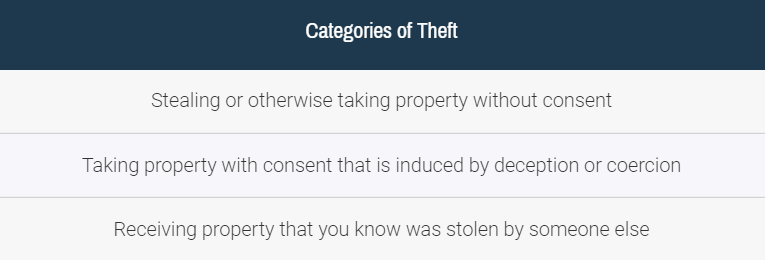Theft, Robbery, and Burglary
Theft, Robbery, and Burglary are offenses that generally (though not always) involve taking someone else’s property without their consent. If you’re dealing with criminal charges for any of these offenses in Lubbock County, you need a criminal defense attorney who will fight for you and present a strong defense on your behalf. Call me today to schedule a free case evaluation.
Theft
In Texas, you can be charged with the crime of theft if you unlawfully appropriate property with the intent to deprive the owner of property. “Appropriate” is basically just another way to say “take”.
In Texas, there are three different categories of theft:

The first category is what people generally think of as simple theft: taking property that does not belong to you. However, Texas has consolidated a range of offenses into the theft statute, so that tricking someone into giving you their property, which is generally referred to as fraud, and receiving stolen property are also considered theft charges.
Theft offenses can be charged as anything from a Class C misdemeanor to a first degree felony, depending on the value and nature of the property stolen, the identity of the victim, and other potentially aggravating factors.
Relevant Statutes:
Texas Penal Code § 31.03 — Theft
Texas Penal Code § 31.01 — Definitions of “Deception”, “Effective Consent”, “Appropriate”, and “Property”
Robbery and Aggravated Robbery

The law specifies that “in the course of committing theft” actually means conduct that occurs:

This means that you can be charged with robbery even if you don’t succeed in committing theft, or if you injure someone while you are fleeing after a successful or failed attempt to commit theft.
A theft crime can be filed as an Aggravated Robbery charge in any of the following circumstances:

Texas law defines a “deadly weapon” as any of the following:

Robbery is a second degree felony, and aggravated robbery is a first degree felony.
Relevant Statutes:
Texas Penal Code § 29.02 — Robbery
Texas Penal Code § 29.03 — Aggravated Robbery
Texas Penal Code § 29.01 — Definition of “in the course of committing theft”
Texas Penal Code § 1.07(17) — Definition of “Deadly Weapon”
Burglary
Texas law recognizes three different types of burglary:

The definition of “habitation” includes buildings and vehicles where people can sleep overnight, and any structures attached to them, such as a garage, whereas “building” refers to both habitations and structures that are not adapted for overnight accommodation, such as a shop or factory.
Generally, burglary is a state jail felony if committed in a building other than a habitation However, you can be charged with a third degree felony for burglary of a non-habitation if you enter a commercial building in which a controlled substance is generally stored, such as a pharmacy, clinic, hospital, nursing facility, or warehouse, with intent to commit a theft of a controlled substance.
Burglary is typically a second degree felony if committed in a habitation, unless you entered the habitation with intent to commit a felony other than felony theft. In this case, burglary of a habitation is a first degree felony
Relevant Statutes:
Texas Penal Code § 30.02 — Burglary
Texas Penal Code § 30.04 — Burglary of Vehicles
Texas Penal Code § 30.01 — Definitions of “Habitation” and “Building”


